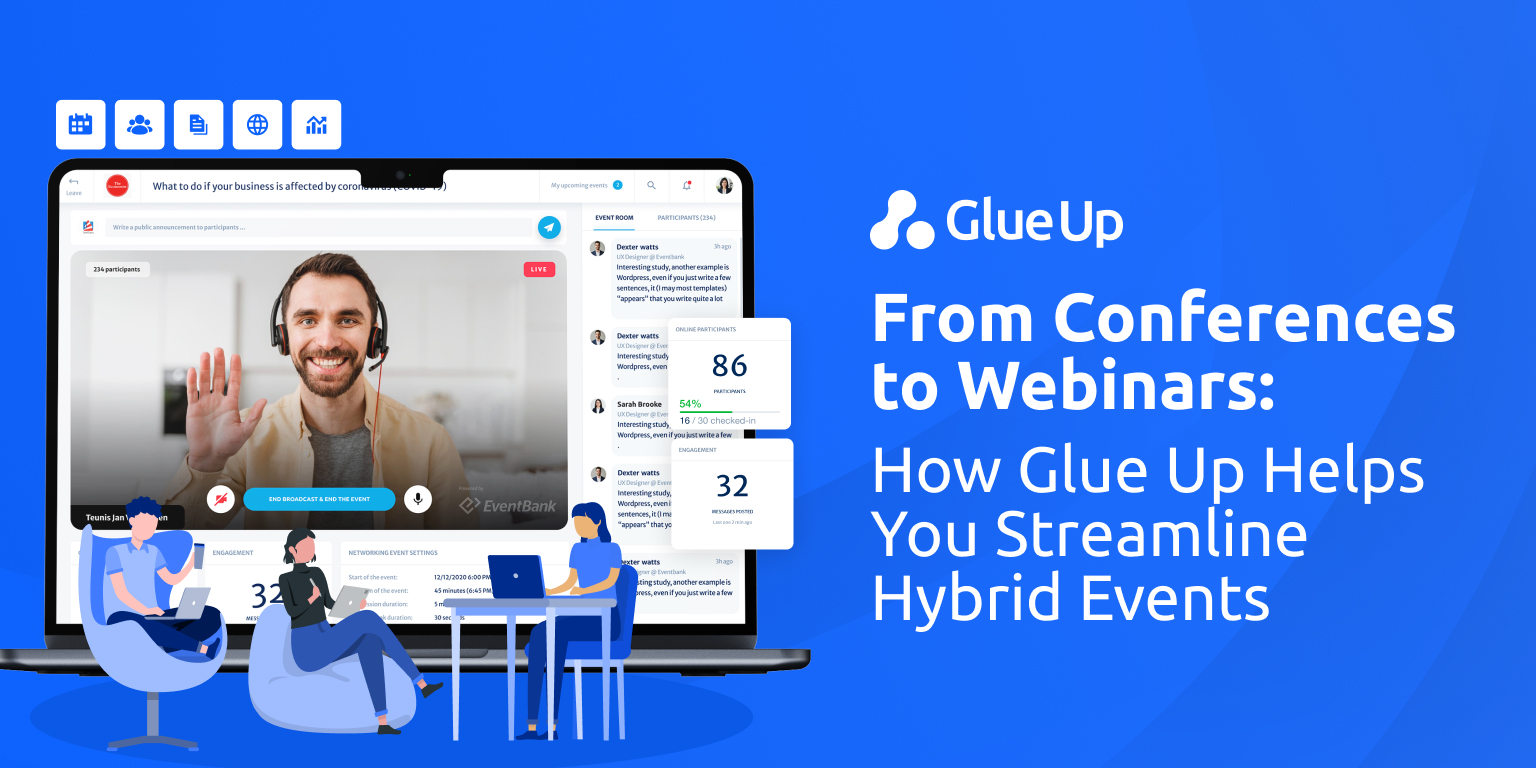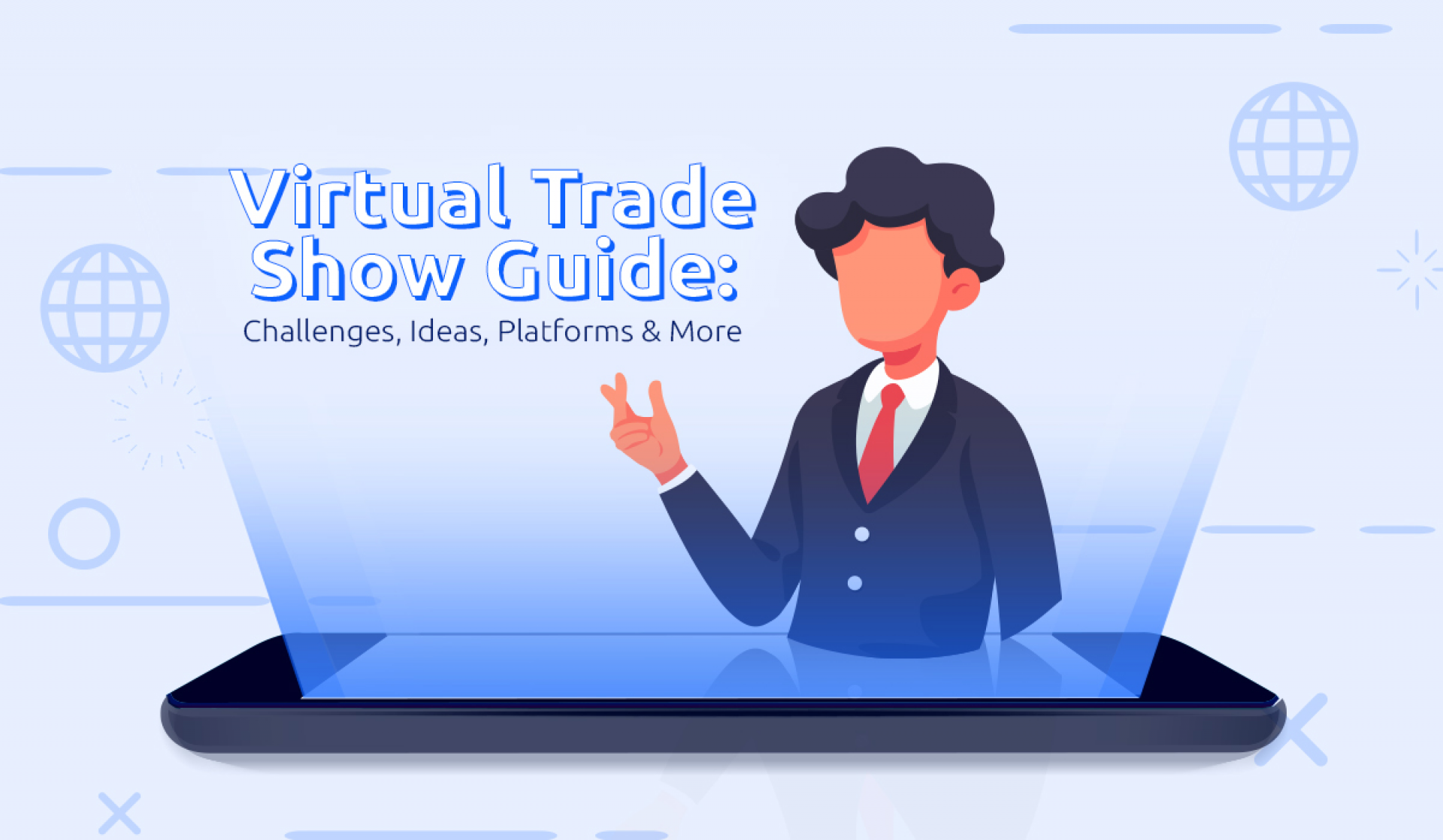
One of the most important lessons that we’ve learned since the onset of the pandemic is that anything can go digital. In an extremely difficult year, innovation and virtual events skyrocketed, especially in the virtual trade show industry. The shift from traditional trade shows to virtual trade shows has enabled people to develop and use digital tools to fulfill their purposes and necessities better.
Certainly, trade shows had to adapt as well, translating into virtual trade platforms and virtual trade solutions to accommodate the current situation that we are living in. According to Forbes, many businesses managed to pivot to reach customers online and meet them wherever they were, translating from traditional trade shows to virtual trade fairs.
In this article, you will learn about the common challenges of hosting a virtual trade show, as well as finding ideas to successfully execute it on an online platform.
Quick Reads
- What is a Virtual Trade Show?
- What Are the Benefits of Virtual Trade Show?
- How Are Virtual Trade Shows Better Than On-Site Events?
- What Are the Features of Virtual Trade Show?
- What Are the Challenges of Virtual Trade Show?
- Virtual Trade Show Checklist
- Virtual Trade Show Types and Ideas
- Best Virtual Trade Show Platforms
What Is a Virtual Trade Show?
Starting from its traditional definition, a trade show is a type of event that is about connecting with people by bringing companies together to show off their newest products and services to potential clients and existing customers.
The comparison between virtual trade shows and traditional trade shows may be difficult since the whole experience revolves strictly around in-person connections. But with the help of the newest technologies, trade show events can be transformed into virtual events. Event organizers may opt to utilize a virtual expo platform with features that equal the traditional in-person experience.
Indeed, a virtual trade show is created to simulate an actual event. It has virtual show booth features, networking, events spaces, and chat functions to add some real-time, dynamic elements to the whole experience in the digital platform.
Just like with a brochure, exhibitors can also include downloadable information and resources about their products. By doing this, they create an asynchronous feature that allows attendees to review the content later.
It’s up to the trade show organizer to find new interesting virtual trade ideas to ‘’keep the spark alive’’ just like in a regular trade show. This kind of approach can bring in elements from the actual physical event.
What Are the Benefits of Virtual Trade Shows?
Research made by Freeman stated that 62% of online attendees thrive on learning and exploring when it comes to participation in an online event. This indicates a huge benefit for all since virtual events can be as rich as the traditional ones—with knowledge and education at their core.
Another important benefit of virtual trade shows is broadened audience reach and increased accessibility. For the very first time, web trade shows can expand their audience like never before and reach beyond the confines of geography.
Attendees can engage in virtual web trade shows worldwide while sitting comfortably at home, getting the same knowledge and engagement as the traditional trade show. They cost less, don’t have any geographical barrier for the attendees, no registration costs, but can lead to higher attendee numbers.
On the other hand, after successfully understanding the technology infrastructure, strategy and marketing behind virtual reality trade shows, the events can be hosted multiple times per year. Unlike regular trade shows, virtual trade shows can be hosted more often, investing less money and getting more engagement from the community.
Nowadays, building a network and community has become more important than before. Establishing a personal connection with clients is fundamental since attendees are one click away from engaging or disengaging. When companies understand the right tools they can benefit from virtual enterprise trade show, they can absolutely host a virtual event that would be even better than the traditional one.
How Are Virtual Trade Shows Better Than On-Site Events?
According to the Global Association of the Exibition industry’s report, exhibitors and visitors spent around $137 billion annually on exhibitions in 2019. Having said this, on-site events can be more interactive and interesting, but their organizational and economic cost doesn’t compare with virtual events.
Furthermore, virtual events will never compare equal to the in-person ones, but at the same time, they can be run more easily. They indeed cost way less money and they bring more people together as well as carrying more visibility.
The other significant feature that virtual trade show companies have in their virtual events is the asynchronous factor: only online events give you the opportunity to record the whole event and save it to rewatch it later.
Sometimes the most unpredictable things happen, like a cancellation or something unexpected that prevents you from attending an event that you had scheduled months in advance. With a virtual conference platform, you will be able to record it. Also, you can watch it anytime anywhere, while getting the same experience and learning that you would get if the event was on site.
The last crucial point would be about exposure to the target client. Onsite trade shows are generally quite dispersive. Most of the time people that come to the exhibition are just wandering around not paying too much attention to the actual product or service.
In the virtual trade shows, you select the audience since the attendees are willing to know more about the product, discuss it, and learn from it. Another great thing about virtual trade shows is that they allow more interactions at once. By doing this, they enhance and widen the communication channels so that the host can speak to an extensive public at once and eventually one-to-one.
With traditional onsite trade shows, it’s more difficult since there are few people to accommodate. Also, when there’s a product presentation to a vast audience, some may be busy or engaged in talking to a potential client so the other participants would have to wait.

What Are the Features of a Virtual Trade Show?
Here are some features of a virtual trade show that you should explore and consider to successfully launch and thrive in the competitive event industry.
Main Hall
You can create a lobby in a virtual trade show platform where attendees can navigate to all your spaces, just like on a show floor in an onsite event. To make the virtual event feature even more vibrant and dynamic, there is the possibility to customize backgrounds, choose different templates, and use videos or banners.
From a customer perspective, the first impact is the most important. That’s why it’s fundamental to surprise them by presenting a clear image of the brand and its products. However, the most important thing would be to make attendees feel like they are in a real trade show, recreating the spaces, colors and bringing them a sense of life.
Exhibit Hall
The exhibit hall is certainly the main core of a virtual event. It is where attendees have the chance to get to know the product in all its functions, while comfortably streaming and watching it anywhere. It has to be interesting because it’s also a place for people to learn and get information about the product.
It can range from a presentation from a single person to a more dynamic conversation. It seeks to engage other event speakers and brings the entire event experience worldwide. Pre-recorded videos or presentations can be added, as well as the option to record the event to give the attendees a chance to replay it.
Exhibitor Booth
A virtual exhibitor booth represents a place tailored for more specific, in-depth information. It’s a ‘’virtual place’’ where attendees can have a more detailed conversation with the business hosts. What’s more, it’s a place where they can read and get more materials about the product, and even request a one-on-one conversation.
Integrated Video Player
Videos are always the melting point between emails, social media, and online channels. Therefore, integrating video content is a great tool to add to a virtual trade event.
Pre-show videos are good to use to promote curiosity among the attendees and give brief information about the virtual event. You can play informational pre-recorded videos about sales or anything related to your industry during the event as well, depending on the different situations.
After the virtual trade show, your organization can use some of the videos played during the whole event or create a video showing the event as a whole and its ‘’human’’ side.
Theater
The theater is the virtual place where the audience is able to watch the brand’s content, either live or pre-recorded. The Theater option can include pools, online or offline webinars, quizzes and Q&As.
Chatroom
Hosting a virtual event is never easy when it comes to interpersonal conversations. The difference between talking face to face to a person and talking behind a screen is massive, and the conversation doesn’t always flow in the same way.
The private and public chatrooms are not only a great tool to ask questions about specific topics, but also to check the answers to pre-asked questions and be able to note them down. For a more personal and private conversation, an attendee can always chat with the hosts in the private chat feature to ask more specific questions about a product function.
Video Meeting Tool
If you can’t meet in person, a video meeting tool is fundamental to connect with people and maintain social connections in the digital world. However, video conferencing isn’t always easy. There can be problems with the audio or the cameras, or even with logging into the event. It’s important to set up a great virtual trade platform to have a great overall experience of the event. A high-resolution camera and a good microphone will help build relationships with members and attendees and increase the events’ effectiveness.
Upload Logos, Banners, Leaflets, and Other Files
When it comes to virtual events, an organization or a brand needs to keep its essence and values even behind a screen. You can do this with event branding, which will be reflected on your company logo, banners, marketing materials, leaflets, stage design, and more. Branding is more important than before, and proudly showing it reflects the event brand and the brand values behind the company.
Networking Lounge
Networking is essential in virtual events. According to Harvard Business Review, networking often leads to more jobs and business opportunities. Furthermore, it allows attendees to get a broader and deeper knowledge, greater status, and most importantly, create new relationships.
Sharing interest with someone new isn’t easy, but you always try to find some point in common, something valuable. However, if the networking is driven by shared interests, it will become more authentic, the conversation will flow naturally, and you can build the whole relationship faster.
Having a networking lounge is a great, fast way to connect with people and give them the opportunity to get to know each other before or after the event. Exchanging business cards or sharing opinions about the product are great ways to start building virtual connections.
Glue Up took networking to the next level and introduced Speed Networking Solution. The networking platform takes the traditional value of a face-to-face networking experience and enhances it with advanced smart matching technology.
It uses computer logic to match people based on their commonalities and interests. Participants can attend timed 1-on-1 sessions, depending on the selected criteria set by the organization during registration prior to the speed networking event. This leads to effective communication among participants that strengthens business connections.
If you would like to know more about this latest product from us, book a demo of Glue Up’s Speed Networking Solution now.
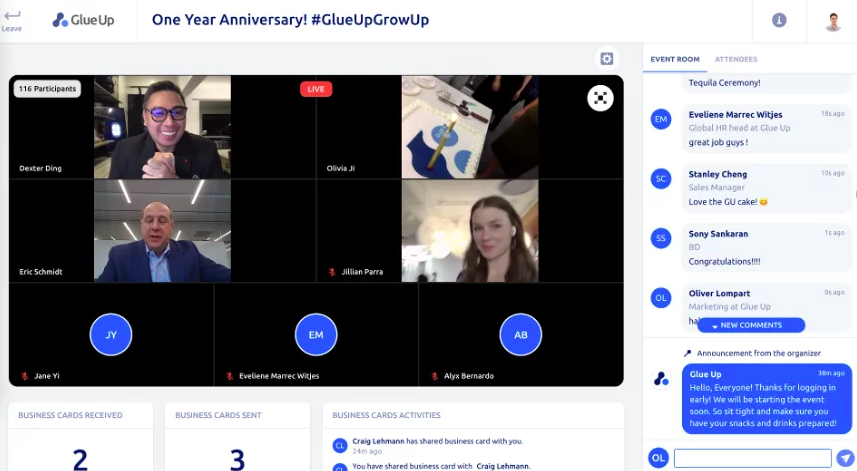
Resource Center
Virtual event software platform should be equipped to provide a resource center for attendees to find information that will help them effectively solve their problems, find assistance, and get guidance. This is a fundamental tool to implement, especially in virtual trade events where attendees could easily get lost and might want to catch up with more information after the event.
Webcasting
Simply put, webcasting is an event that is being streamed live to attendees in a real-time frame. It’s about broadcasting a live stream of audio, video, or virtual presentation to a small or big audience. This allows businesses to stream their virtual event to all regions instead of hosting events locally and simultaneously.
Gamification
The main issue with virtual events would be the attention span. It’s hard to keep attendees entertained behind a screen, especially when they cannot interact with people as much as they would do in an on-site event. Gamification is an excellent form of adding ‘’games’’ into an event to make it less mechanic and more dynamic, which can increase participation among clients.
Gamification in itself is all about engagement which will eventually influence business results. When attendees participate in gamification activities, they interact in a practical way with the product, business, and services. As a result, this can also increase employee engagement about the company’s performance.
A.I. Powered Networking & Content Suggestions
The ability to translate personal data to past usage and learn what customers might want will be crucial to taking the virtual event experience to the next level. With AI-powered networking, attendees and clients can see other attendee suggestions they can connect with, either via text, email, or video call. On the other hand, content suggestion helps customers access content, like documents, presentations, or videos, based on what they like and their behavior.
Passively accepting what the virtual event enterprise is showing would lead attendees to fall into boredom and not be engaged as much as the company wants to. Artificial intelligence tailors the content based on the attendees’ interest and from the data they furnish. If the attendees visited a virtual room or downloaded additional information, A.I will come up with additional suggestions for them.
Detailed Reports to Measure Event Success
Every company has a goal when deciding to host a virtual trade event: whether the main goal is to maximize profit, audience engagement, or obtain more brand recognition. When a virtual event ends, the best way to know quickly if the attendees liked it is via surveys. Indeed, events surveys allow you to get in contact with them and let them give you honest feedback.
Net Promoter Score (NPS) is another way to measure the event's success. The question is simple and straightforward: "On a scale of 1-10, how much would you recommend this event to your friends?" The overall score is a key indicator of the value brought to the attendees through the event.
The last one would be the session analytics, which shows the session ratings, the attendees, the virtual audience, and the average view duration. To determine if the session was a success, you need to analyze data. You can look for the top-performing topics in the event and try to work on the less attended ones.
To best interact with your attendees and get honest feedback, feel free to book a demo of Glue Up’s Surveys Solution. It’s an easy way to create surveys, quizzes, and polls and analyze their preferences.
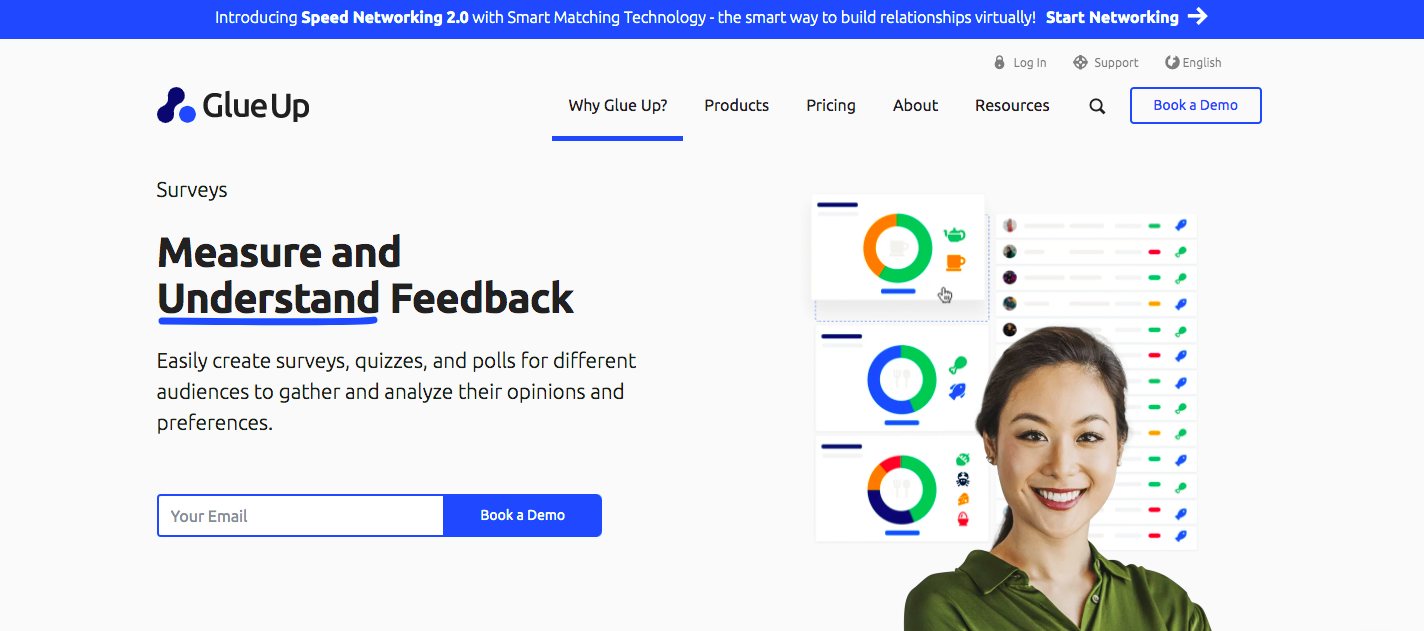
What Are the Challenges of a Virtual Trade Show?
Find a list of challenges that you should take into consideration to become prepared for any mishaps when hosting virtual trade shows.
Bringing in Experiences
The unprecedented times we are currently living in, with isolation and uncertainty, weren’t exactly what we expected. This also means there should be a massive reset of values and expectations on many things in typical daily life, evaluating pros and cons. One important thing that has been processed the hard way, especially in virtual events, is the importance of the community and the shared experiences.
When hosting a virtual show, the target audience is most likely to consider expanding to new personas and industries that could broaden the network even further. Furthermore, adjusting the whole event to bring in the same customer experience to attendees would open up more possibilities, even though the main strategy wouldn’t be the same as the live event strategy.
Changing the Exhibitor Mindset
Organizers need to know how to change the way they think. They should reset expectations and change the mindset on what the event should look like. Virtual learning deals with education, networking, and information that can be achieved in online learning as well.
What we’ve found out from the data we’ve been collecting is that the online world is all about opening doors, broadening the sales funnel, and bringing in new people. It’s about getting a broader audience to become familiar with your products and services, recognizing that having the events online means nourishing relationships and bringing brand awareness.
Engagement Takes a Different Form
Many modern event platforms provide the essential tools to keep virtual engagement alive, such as live chats, polling, and Q&A sessions. However, these basic features aren’t enough to build a strong community and keep the engagement high.
Attendees indeed have high expectations and behind a screen becomes harder to stay focused, especially when they are one click away from disengaging. Engaging clients is one of the hardest challenges organizers face when it comes to virtual events.
For this reason, organizers must be able to pivot the event to a more hybrid, dynamic, and vibrant meeting, with the help of a fully integrated event management platform. This can be done through gaming, quizzes, networking, booths sessions, and incorporate breaks throughout the event to avoid boredom.
Making Connections
Creating meaningful connections during online events is hard. Some are even wondering if it’s even possible to make connections online. Before entering an online event and meeting new people, the best thing to do is to ask: "What I'm hoping to learn?" "Who do I want to meet?" "What do I want to talk about?"
Online organizers have to reassure attendees that making connections isn’t that different from reality, it all starts with a simple personal question and goes as far as making friends and business relationships.
Sitting alone at a computer doesn’t mean that it’s impossible to meet people. Reaching out and finding common points is the best way to start the conversation. It can be a bit awkward at the beginning, but everything will flow naturally you’ve built rapport with anyone. So even when the networking is over, the conversation can keep going by sharing experiences and thoughts on the event.
Virtual Trade Show Checklist
Are you ready to launch a virtual trade show soon? Be sure to go through this checklist and implement every item for your event to run smoothly.
Do Your Platform Research
Knowing all the functions of your platform and exploiting them at the maximum will surely boost the interaction with your attendees, sponsors, and exhibitors by giving them access to the right tools, surveys, and creating a more dynamic event.
Understand Your Security Needs
When hosting a virtual event, event organizers have to face a series of cyber threats that could breach data and attack the security and privacy of attendees. Event planners have the responsibility to handle personal and valuable information and make sure it stays protected. There should be cyber security and data privacy measures. However, the exact requirements depend on the size and as a result, the level of security required.
Devise a Marketing Plan
You should base your event’s goal on a clear and detailed marketing plan. Starting from the preparation of the marketing content, the event schedule, and the speaker list. Highlighting the key messages, testimonials, or videos from previous events might help you to collect content for the event.
Moving ahead to creating the event and the information, you need to properly identify the target market through demographics like age, gender, or industry and graphic data like interest and motivations.
Since marketing is all about engaging communities, tailoring the message for your target audience is the key to attract your consumers’ interest. You might add videos or content from the previous events, adding promotions like early bird promotions or last-minute promotions to create ‘’buzz’’ or increase word of mouth.

Plan and Organize
To achieve the organization's goals, the technological support to the platform and easy navigability within the commercial offers are fundamental. In fact, the primary element of difficulty in accessing an online event is the complexity of browsing throughout it.
Assistance through tutorials and virtual support with the online assistance of a supervisor represents the friendly environment that makes access to the platform easy, pleasant, and therefore productive. Hence the increase in the conversion of visits into sales and purchases.
Monitor Event With Data Analytics
Data is more valuable than ever before in the digitalized world we live in today. Data analytics is the process of understanding, analyzing, and drawing insights from the available data to make informed business decisions. Its role in virtual events is essential since it helps better understand attendees’ behavior and makes events more impactful.
With active data collection organizers collect attendees’ preferences and thoughts, this type of data is more direct. On the other hand, passive data collection gathers information of your attendees without direct content with them but just collecting it during virtual events. Glue Up has launched Membership Engagement Scorecard as a data analytics platform in order to help organizations interested in running virtual trade shows in learning deeply about their member engagement.
Virtual Post-Event Support and Presence
After a virtual trade event, you should reach out and show support to the audience in order to increase word of mouth and strengthen the relationship with them. Requesting feedback, sending in-depth information material, showing support and assistance are only a few ways to keep in touch with visitors and customers.
Virtual Trade Show Types and Ideas
Here you will find a list of creative ideas for your virtual trade show event, from food to real estate virtual shows.
Virtual Food Show
A virtual food show and other virtual food experiences can bond people across the world, and they are a fun interactive, and memorable way to present a product or a service to an audience.
Virtual Car Show
If you are stuck at home with nothing to do, you could attend a virtual car show that allows you to get closer to some of the most amazing cars in the world. This is one of the best ideas to bring together car enthusiasts since car buyers spend a lot of time looking for a vehicle online anyway.
Virtual Property Show
Give your attendees a chance to connect with real state agencies, banks, and legal advisors through a virtual property show. A virtual property show is designated to help bring businesses and consumers together, featuring virtual booths for clients to virtually walk through properties and ask any questions related to them.
Virtual Technology Show
With a virtual technology show, you can enjoy the latest challenges, opportunities, trends, and innovations within the internet and see how the industry is changing. Attendees have the opportunities to explore the latest tech innovations and solutions, hear professional key speakers and get in-depth information about the e-tech market.
Virtual Exhibitions and Events of Localities and Tourist Facilities
Tourism and holiday resorts represent an important segment of world business when it comes to holidays and vacations. Clients who can plan holidays in hotels and hotel villages worldwide constitute a rich target for the world of tourism since they are willing to spend more money to ensure a memorable experience. The virtual tourist fair is the ideal meeting between hoteliers and tour operators.
Virtual Exhibitions on Publishing Market and Book Production Events
The editorial market is growing rapidly, both qualitatively and quantitatively. Over 60,000 editorial titles are produced every day. Therefore it is impossible to physically access trade fairs or events that bring together all the general and thematic editorial productions. In this case, virtual fairs allow immediate, selective, and in-depth access through cards and illustrative reports of the books.

Virtual Exhibitions and Events of Art and Antiques
The virtual fair allows you to see and analyze styles, objects, tools, and decorations in different eras, continents, and civilizations, all available in a 3D virtual platform. In addition, the whole event allows you to selectively investigate additional elements such as realization techniques and price quotes.
Virtual Exhibitions and Events of Clothing and Fashion
Virtual fairs in a sector like this can be an excellent opportunity for companies, fashion designers, and buyers to meet. Fashion is indeed a vast sector that affects all sectors of society and the economy: fast fashion, workwear fashion, youth fashion, vintage fashion, etc. Therefore, it constitutes an opportunity to access immense and varied product visibility, which allows you to see, evaluate and close deals.
Virtual Furniture Exhibitions and Events
By joining a virtual furniture exhibition, you can see and evaluate the many opportunities that this industry offers for the home or business furniture sector. This sector also carries out strong annual productions both in quality and quantity.
Virtual Exhibitions and Events of Industrial Components
The industrial and metalworking components sector constitutes a sector of world interest and involves millions of operators in every continent. The presentation of innovative models and cutting-edge technical solutions finds an efficient space for promotion and sales in virtual exhibitions.
Best Virtual Trade Show Platforms
 Here is a list of some of the best virtual trade show platforms for your virtual events:
Here is a list of some of the best virtual trade show platforms for your virtual events:
1. Glue Up
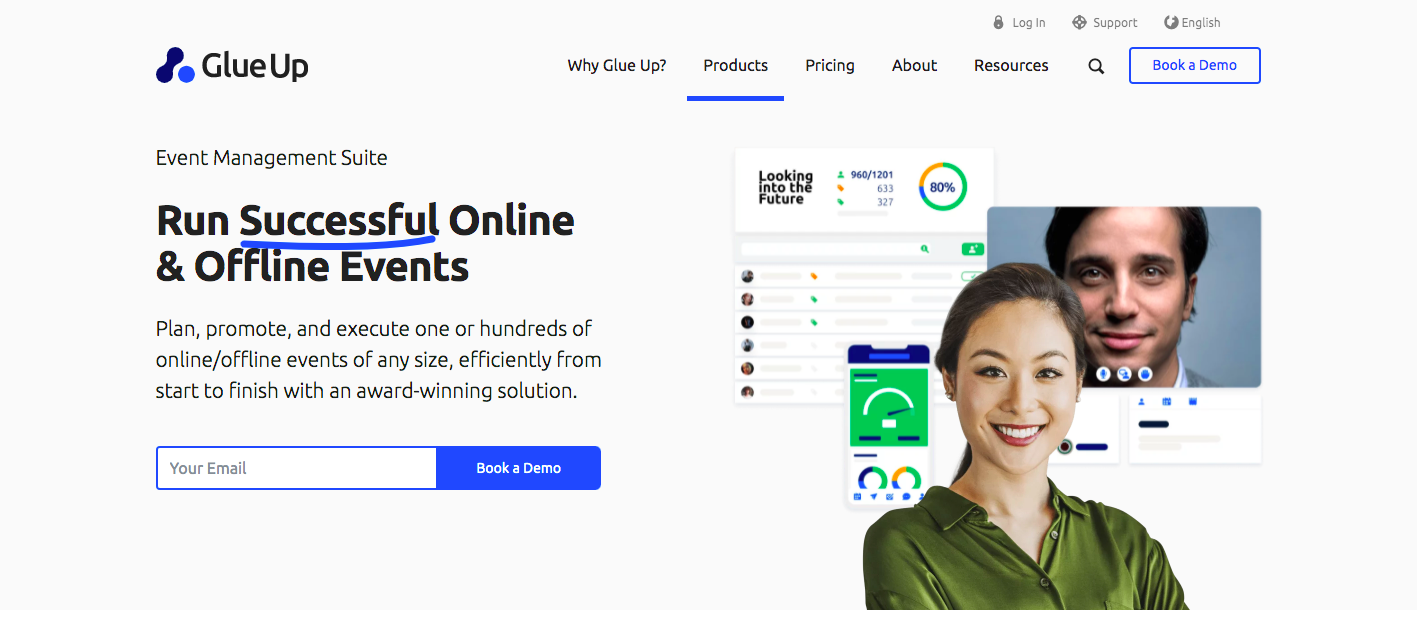 Glue Up is an all-in-one software that has a full suite of tools designed to streamline operations, modernize processes, and eliminate engagement challenges. Glue Up’s Event Management Software allows you to plan and execute online or offline events with its website builder, custom registration forms, online ticketing, and many more.
Glue Up is an all-in-one software that has a full suite of tools designed to streamline operations, modernize processes, and eliminate engagement challenges. Glue Up’s Event Management Software allows you to plan and execute online or offline events with its website builder, custom registration forms, online ticketing, and many more.
2. INXPO
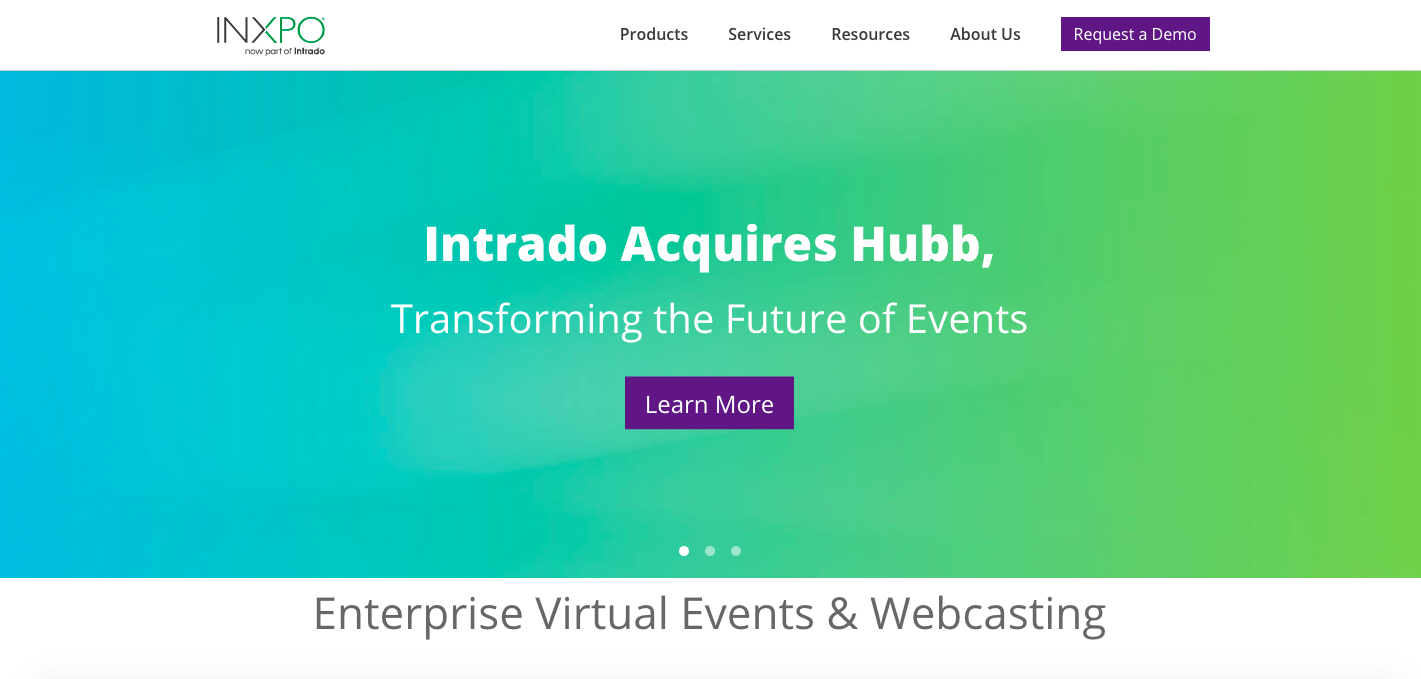 INXPO is an online event platform that allows you to have access to many streaming video solutions, like live streaming, conferences, webcasts, and video portals for events of all types.
INXPO is an online event platform that allows you to have access to many streaming video solutions, like live streaming, conferences, webcasts, and video portals for events of all types.
3. Map Your Show
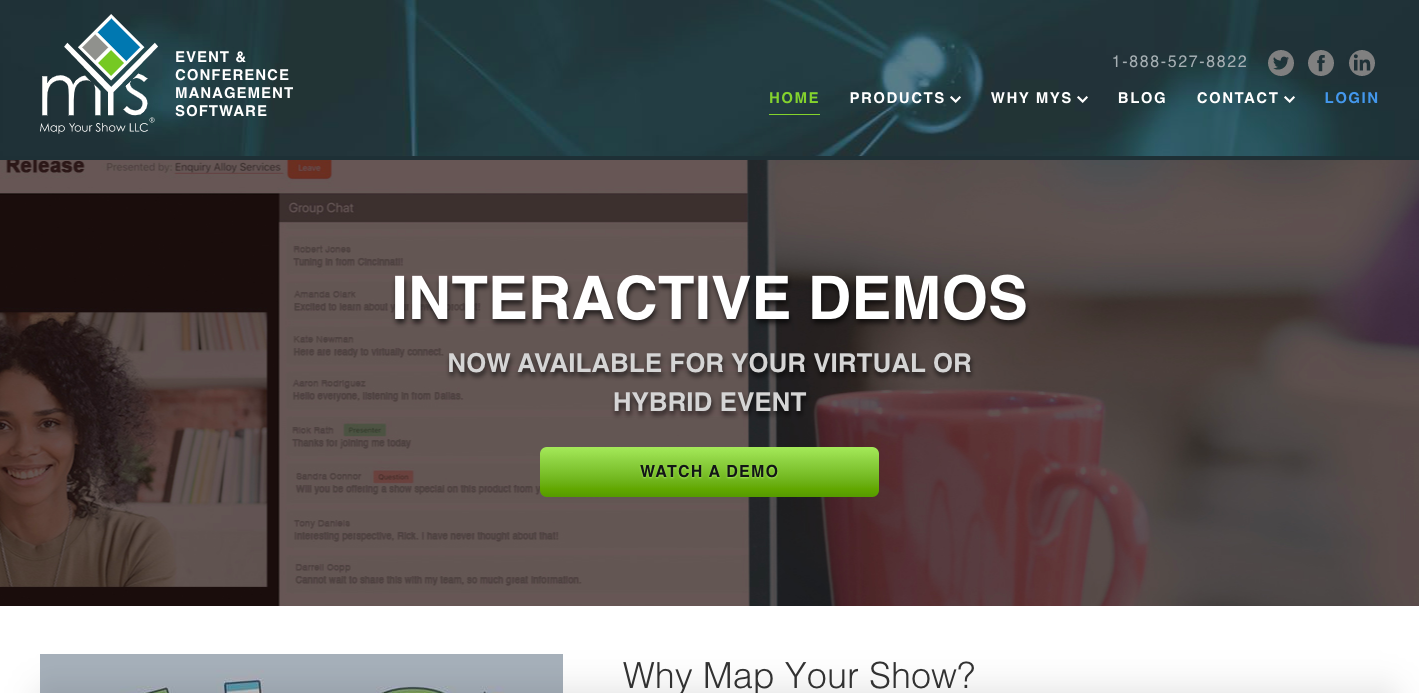 Map Your Show has a suite of products that can create professional events and conferences, helping companies to manage their data, attendees and design their apps and floorplans easily.
Map Your Show has a suite of products that can create professional events and conferences, helping companies to manage their data, attendees and design their apps and floorplans easily.
4. Communique
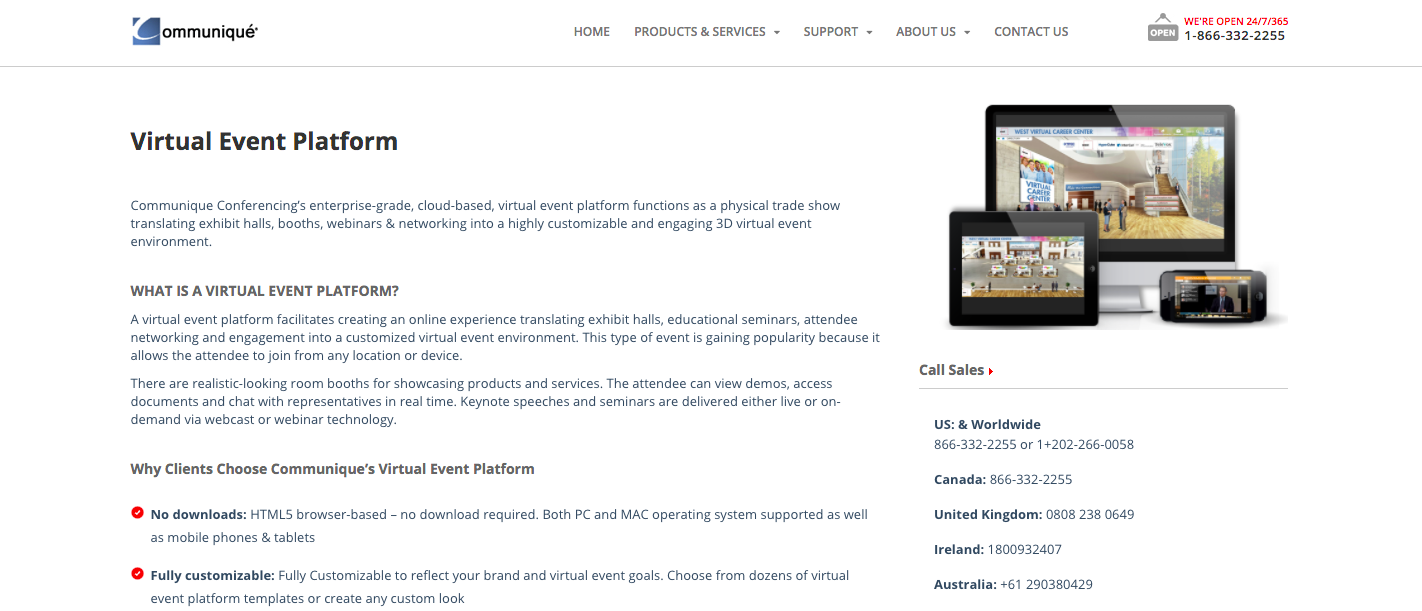 Communique is a cloud-based, virtual event platform that offers solutions to corporations, non-profit, and government organizations when launching trade shows, virtual booths, networking, and webinars.
Communique is a cloud-based, virtual event platform that offers solutions to corporations, non-profit, and government organizations when launching trade shows, virtual booths, networking, and webinars.
5. GTR
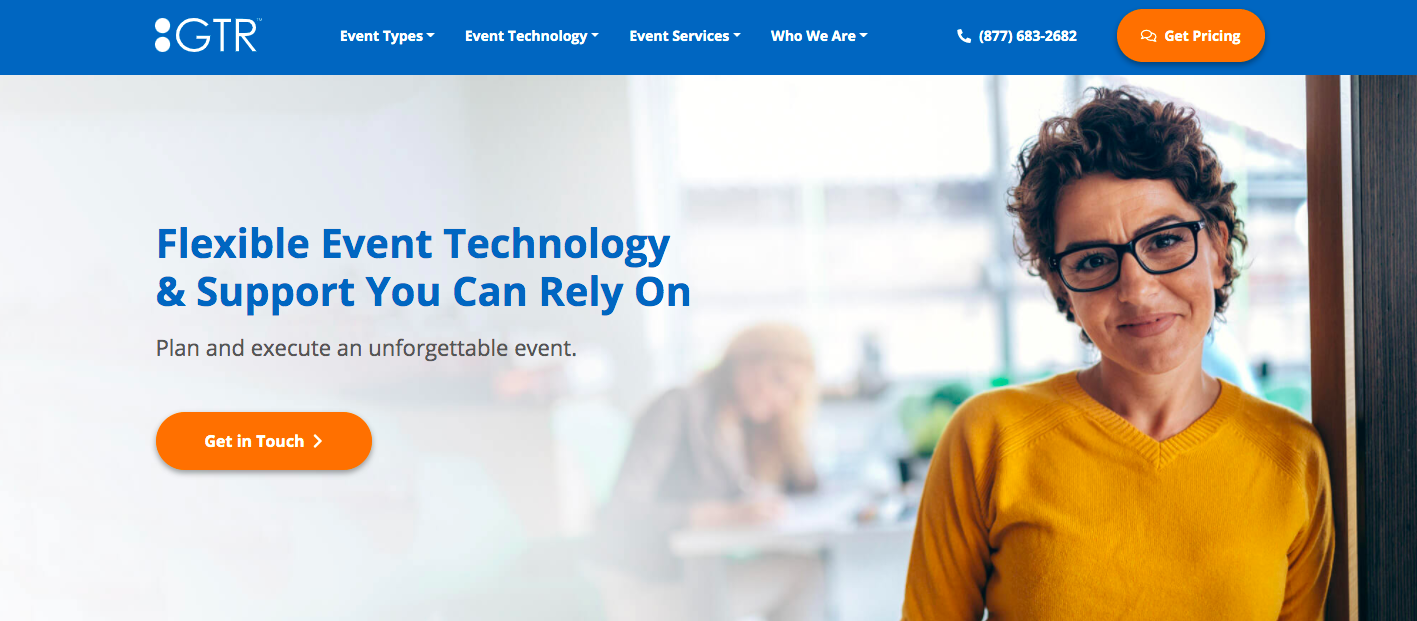 GTR offers a wide range of innovative solutions to help produce webinars, virtual events, and trade shows, which can improve the whole virtual experience of clients.
GTR offers a wide range of innovative solutions to help produce webinars, virtual events, and trade shows, which can improve the whole virtual experience of clients.

